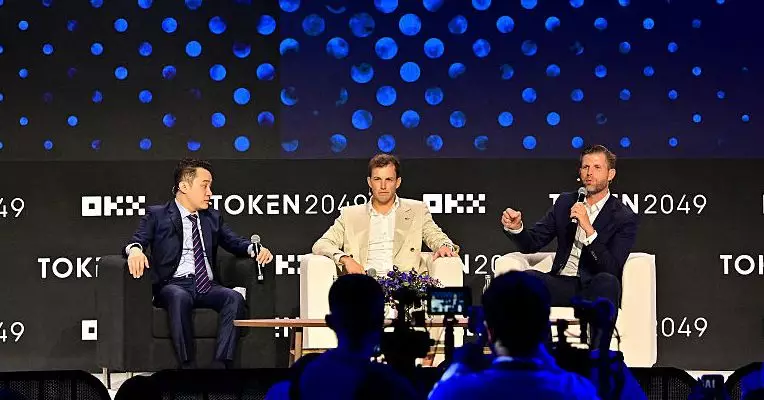In the rapidly evolving domain of cryptocurrency, ethical dilemmas and potential conflicts of interest abound, particularly when prominent political figures become involved. One of the most striking examples of this intertwining of finance and politics is the case of World Liberty Financial (WLF), a crypto firm partially owned by former President Donald Trump and his family. The recent activities of this company have sparked widespread debate, raising questions about the integrity of both the cryptocurrency market and governance when personal and political interests overlap.
The Dubai Dilemma: A Coincidence or a Strategy?
When Eric Trump shared the stage with Zachary Witkoff at the Token2049 conference in Dubai, it was more than just a networking event; it was a strategic convergence of family business and global finance. The announcement that WLF’s stablecoin, USD1, would facilitate a massive $2 billion investment into Binance, the largest cryptocurrency exchange in the world, has stirred up controversy. Critics are questioning whether this partnership is merely a lucrative business transaction or a sophisticated means of influence peddling. WLF’s involvement positions it uniquely as an intermediary, likely yielding tens of millions in profits, further blurring the lines between entrepreneurial ambition and ethical business practices.
The Mechanism of a Stablecoin and Its Implications
Stablecoins like USD1 are designed to provide a sense of stability in the volatile cryptocurrency market. Backed by a reserve of cash and assets, they offer a predictable value, typically tethered to the US dollar. In theory, this creates trust and facilitates transactions in a domain often criticized for its fluctuations. However, the model introduces the potential for significant profit contingent on market dynamics, particularly interest rates. With the current allure of short-term U.S. Treasuries yielding over 4%, the stakes are massive. This financial model not only benefits the firm but also raises alarms regarding the broader implications of a politically connected entity profiting from international relations and foreign investments.
The Shadow of Influence and Favoritism
The enormous financial implications tied to WLF’s operations paint a troubling picture of potential favoritism. The structure of international business today means that foreign entities engaged with WLF could, in theory, be contributing to the wealth of the Trump family and, by extension, cultivating goodwill with their patriarch, the former president. This raises crucial questions: Is there a fine line between legitimate business expansion and unethical political exploitation? Critics, such as George Selgin from the Cato Institute, voice concerns that this arrangement is not merely a business venture but a clear avenue for influence peddling.
The Trump Family’s Financial Footprint
World Liberty Financial’s ownership, with the Trump family holding a substantial 60% stake, complicates the narrative even further. As the dynamics of cryptocurrencies intermingle with personal finance and political power, the potential for conflicts grows. This relationship prompts scrutiny over how investments, trust, and political capital may be manipulated. How much transparency do international investors have regarding their potential influence? The intricate web of WLF’s dealings invites a closer examination of the intricate dance between money and politics at the highest levels.
Navigating Ethical Gray Areas in Cryptocurrency
As cryptocurrencies gain mainstream acceptance, the need for stringent ethical standards and regulations becomes increasingly urgent. The absence of a comprehensive regulatory framework has allowed entities like WLF to straddle the line between innovation and ethical accountability. The emerging consensus among critics is that unless concrete measures are put in place to address these conflicts of interest, such situations will continue to breed distrust among those engaging in the cryptocurrency market.
The Path Ahead: Reevaluating Ethics in Finance
The case of World Liberty Financial serves as a critical touchpoint for understanding how financial entities can leverage political connections for potential gain, stirring ethical quandaries that deserve public scrutiny. As market players and regulators deliberate the implications of the Trump family’s stake in cryptocurrency trading, it is essential to foster a dialogue around accountability and ethics in the financial technology sector. The future interplay between politics and cryptocurrency will require comprehensive oversight to ensure that innovation does not come at the cost of ethical standards.

